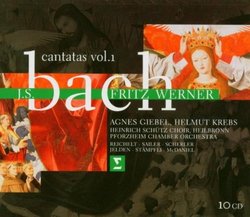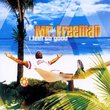| All Artists: Bach J.S, Werner, Giebel, Hoffgen, Lisken Title: Bach J.S: Cantatas 1 Members Wishing: 0 Total Copies: 0 Label: Warner Classics UK Original Release Date: 1/1/2005 Re-Release Date: 8/16/2005 Album Type: Box set, Import Genre: Classical Style: Number of Discs: 1 SwapaCD Credits: 1 UPCs: 0825646140121, 825646140121 |
Search - Bach J.S, Werner, Giebel :: Bach J.S: Cantatas 1
 | Bach J.S, Werner, Giebel Bach J.S: Cantatas 1 Genre: Classical
|
Larger Image |
CD DetailsSimilar CDs
|
CD ReviewsBach from a Bygone Era Johannes Climacus | Beverly, Massachusetts | 02/27/2008 (4 out of 5 stars) "I applaud Warner/Erato's decision to reissue Fritz Werner's entire Bach legacy in three generously packed and amazingly intexpensive volumes (two for cantatas and a third for the Passions, Oratorios, Motets and Mass in B Minor). Werner hailed from a generation of Bach "specialists" that favored a dedicated, unpretentious approach to the Leipzig Cantor's sacred works. Scholarship is worn lightly, and modern instruments are employed along with a modest-sized choir and soloists with lighter voices than was the operatic norm at the time. Werner ended up recording about sixty Cantatas for Erato from 1957 through 1974, and it is those which are anthologized here, and in a companion volume, under the appropriate rubrics for the liturgical year. Do not expect anything like the professionalism of today's period performance practice ensembles. The choral singing, though pleasingly transparent of tone, can be indistinct in diction and unreliable in intonation. The orchestral playing, despite some fine wind and brass soloists, is rather lacking in refinement. The vocal soloists, on the other hand, are often oustanidng--particularly Helmut Krebs, Agnes Giebel and Barry McDaniel, who were among the most gifted oratorio singers of their generation. Werner's tempos are apt to be slow, his phrasing overly smooth, and his rhythmic articulation lazy, at least when heard from the vantage of such early music practitioners as Gardiner, Suzuki and Koopman. Taken on its own terms, however, Werner's laissez-faire approach tends to bring out the lyricism and meditative qualities of the music better than the more aggressive style in favor today. Werner also conveys the intimacy and charm of the music more effectively than many of his contemporaries. Karl Richter, who gave us a similar cycle of 75 cantatas arranged for the liturgical year, sounds too interventionist and heavy-handed when compared to Werner. Many will prefer Werner's more subdued, yet incisive account of BWV 28 ("Gottlob! Nun geht das Jahr zu Ende"), for instance, to Richter's hyperintense, even grandiose version. And much the same can be said wherever Werner's and Richter's cantata cycles overlap. Though I frequently prefer Richter's trenchant insights into Bach's musico-theological symbolism, I increasingly find his inflated textures and rigid manner distracting. Werner, on the other hand, could never be accused of being square or mechanical, though he can be disappointingly flaccid where one expects some exuberance and flair (as in BWV 110, for instance). Taken as a whole, however, Werner's Bach cantata series represents a thoughtful and engaging way of performing this sublime music. Moreover, there are several Cantatas (such as BWV 8, 43, 61 and 130) in which Werner remains unsurpassed, even after several decades, numerous competitors, and a revolution in our understanding of Baroque performance practice. Many collectors will fondly remember these recordings from the halcyon days of LP, when they were circulated here by Musical Heritage Society. I am pleased to report that the sound on these CDs is vastly superior in clarity and focus to those old MHS pressings, so listeners inclined toward nostalgia for the days when each new Bach cantata recording was an adventure of discovery need not hesitate to replace their well-worn LPs with these modestly-priced volumes from Warner (all three of which are available on this website; consult my review for Volume III). Younger listeners formed by today's more exacting performance standards might also find musical as well as spiritual refreshment in sampling a long-vanished, but often rewarding, style of Bach interpretation." Great to hear old friends again... Teemacs | Switzerland | 11/13/2008 (4 out of 5 stars) "So there I was, one Saturday afternoon, working under the car with the radio on. And then came this tune, which I recognised from Jacques Loussier, except this was the original. It was part of "Wachet auf, ruft uns die Stimme" (Sleepers, awake) BWV140. So I bought the LP (yes, THAT long ago), on the French Erato label, by Fritz Werner. I was to buy a lot more of those LPs. And now here they all are, in two volumes. Encouraged by the review of Johannes Climacus, I bought them.
I concur with most of what Johannes says. These are old recordings, in the sense of both time and interpretation, a world away from the Gardiners and Suzukis to whom I now habitually listen. They are slower, softer, more romantic - although you can sense that Werner is already moving away from overly romantic readings. Some of the recordings are poor (ditto the transfers to CD), and the choir and vocal soloists sometimes let the side down. To balance that, Werner used some of Erato's outstanding instrumental soloists. Chief among these was super-trumpeter Maurice André, whose wonderful burnished tone and flawless articulation (of a type and standard simply not possible on natural trumpets) ornaments many of them - listen to André blow his horn in BWV147 ("Herz und Mund", known for "Jesu, joy of man's desiring"), underline the grim judgement aria of BWV90 and soar gloriously at the end of BWV31. Most importantly, it should be remembered that there is no perfect, correct way to play Bach. This is music for eternity, destined to be interpreted in many different ways, none more correct than the others. As Johannes says, there are cantatas where Werner simply remains peerless - I still love that BWV140 above any other version I've ever heard. Lovers of Bach will find much pleasure in these sets." |

 Track Listings (31) - Disc #1
Track Listings (31) - Disc #1
